Ministry of Tribal Affairs
National Tribal Health Conclave 2025 under Dharti Aaba Janjatiya Gram Utkarsh Abhiyan - Advancing Holistic Healthcare for Tribal Communities
Posted On:
21 JAN 2025 3:21PM by PIB Delhi
Ministry of Tribal Affairs (MoTA), in collaboration with the Ministry of Health and Family Welfare (MoH&FW), had organised the National Tribal Health Conclave 2025, on 20th January 2025 at Bharat Mandapam, New Delhi. This landmark event is a pivotal initiative under the Dharti Aaba Janjatiya Gram Utkarsh Abhiyan, aimed at addressing the critical health and well-being challenges faced by India’s tribal communities.
India’s tribal communities often face unique healthcare challenges due to geographical isolation, socio-economic vulnerabilities, and deeply rooted cultural traditions. These factors contribute to significant disparities in healthcare access and outcomes, requiring specialized attention and solutions.
In response to these challenges, the Government of India has undertaken several transformative steps. Among these is the launch of the National Sickle Cell Elimination Mission by Prime Minister Shri Narendra Modi, targeting the eradication of sickle cell anemia by 2047. Complementing this mission, the Ministry of Tribal Affairs has introduced several initiatives under the Dharti Aaba Janjatiya Gram Utkarsh Abhiyan to ensure holistic health and well-being in tribal regions.
Key Efforts and Initiatives in Tribal Healthcare:
The Ministry of Tribal Affairs (MoTA), in collaboration with MoH&FW, AIIMS, and other stakeholders, has launched several initiatives:
- Bhagwan Birsa Munda Chair of Tribal Health and Haematology: Established at AIIMS Delhi, this chair serves as a multi-disciplinary platform for research and data collection on tribal health.
- Centres of Competence (CoC): 15 CoCs have been sanctioned in 14 states to enable advanced and prenatal diagnosis of sickle cell anemia, a prevalent genetic condition in tribal populations.
- Collaborative Approach: MoTA is working closely with MoH&FW, MoAYUSH, MoWCD, NHM, AIIMSs, CoCs, ICMR, UN agencies, NGOs, and state tribal welfare departments to ensure effective healthcare delivery.
The National Tribal Health Conclave 2025 brought together key stakeholders, including officials from the Ministries of Health and Family Welfare, Women and Child Development, AYUSH, Social Justice and Empowerment, senior state government officials, NHM representatives, AIIMS directors, tribal health experts, premier institutions, UN agencies, NGOs, and more. The event has focused on identifying priority areas for policy intervention, action-oriented research, and course-correction initiatives to strengthen the tribal healthcare system.
Objectives of the Conclave:
- Facilitate discussions to explore innovative healthcare delivery models for tribal regions.
- Identify priority areas for policy interventions and research.
- Develop culturally appropriate health strategies to enhance health-seeking behavior.
- Strengthen healthcare systems through capacity building, community engagement, and monitoring mechanisms.
- Create a comprehensive action plan to improve healthcare access and outcomes in tribal areas.
Inaugural Session Highlights:
The conclave was inaugurated by Shri Jual Oram, Union Minister for Tribal Affairs, with the presence of MoS (TA) Shri Durgadas Uikey, Secretary of Tribal Affairs Shri Vibhu Nayar, and Director of AIIMS Delhi Prof (Dr) M Srinivas.
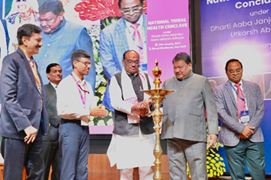
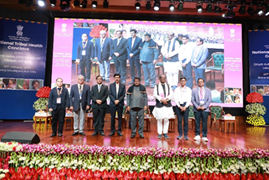
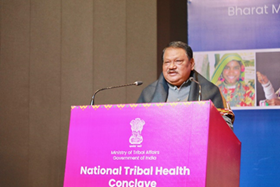

More than 400 participants from across the country attended the conclave, including Director of AIIMS Nagpur Prof (Dr) Prasant P Joshi; Director of AIIMS Deogarh & AIIMS Patna Prof (Dr) Saurabh Varshney; Director of AIIMS Bhubaneswar Prof (Dr) Ashutosh Biswas; Director of AIIMS Guwahati Prof (Col) Ashok Puranik; Director of AIIMS Kalyani Prof (Dr) Ramjii, and Shri T Roumuan Paite, Joint Secretary, MoTA.
Letters of Intent were exchanged between MoTA and AIIMS Delhi for adopting a tribal block in Odisha to conduct an etiological study, undertake field research on health conditions, and execute capacity-building programs.
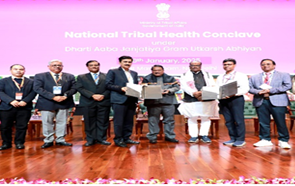

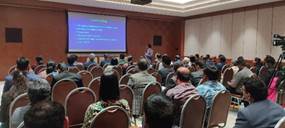
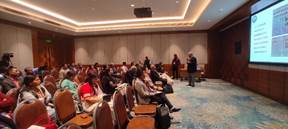
After inaugural session, various focussed thematic discussions held:
The conclave featured in-depth sessions on:
- Strengthening Healthcare Systems: Exploring telemedicine, mobile medical units, and capacity building.
- Traditional Healers: Integrating indigenous knowledge systems into mainstream healthcare.
- Nutrition and Adolescent Health: Addressing malnutrition, reproductive health, and traditional food practices.
- Disease-Specific Interventions: Targeting sickle cell disease, addiction, and mental health.
- Cultural Sensitivity: Balancing traditional lifestyles with improved health outcomes.
Expected Outcomes:
- A strategic roadmap for enhancing healthcare delivery in tribal regions.
- Integration of traditional healers and practices into formal healthcare systems.
- Nutrition-centric initiatives to combat malnutrition and promote adolescent health.
- Targeted interventions for managing rare diseases, addiction, and mental health issues.
- Strengthened public health infrastructure with community participation and technology integration.
The National Tribal Health Conclave 2025 marks a significant milestone in the Government of India’s commitment to the holistic development of tribal communities. By fostering collaboration, innovation, and inclusivity, this initiative seeks to deliver sustainable healthcare solutions while preserving the rich cultural heritage of India’s tribal populations.
***
PSF/DK
(Release ID: 2094806)
Visitor Counter : 2413